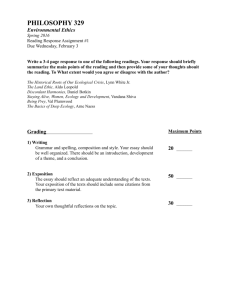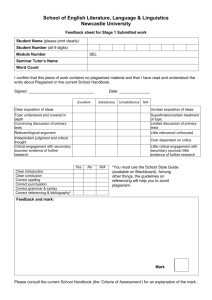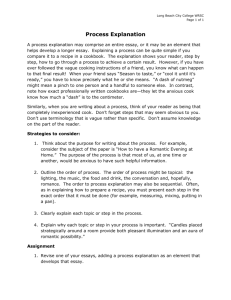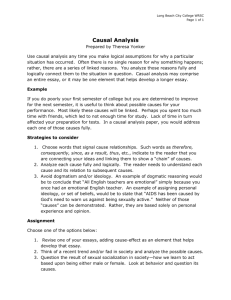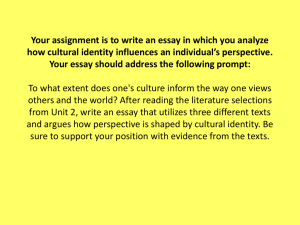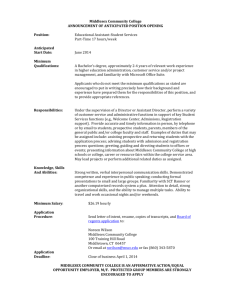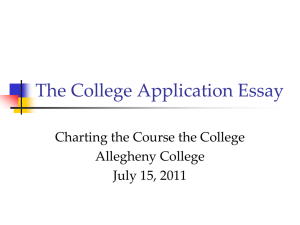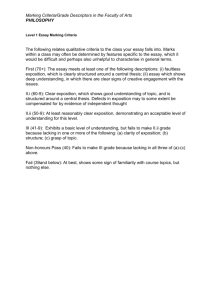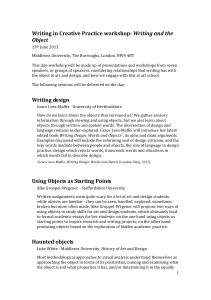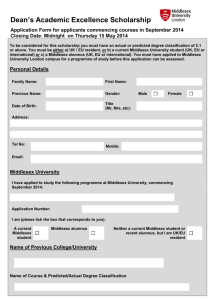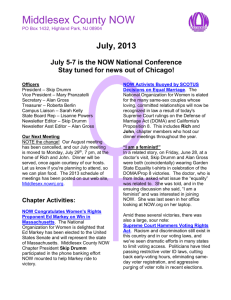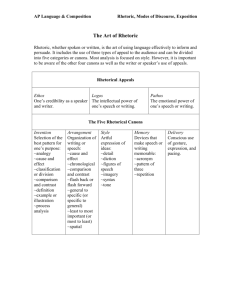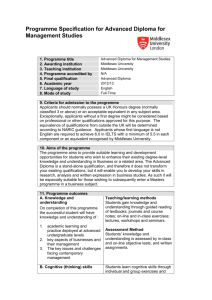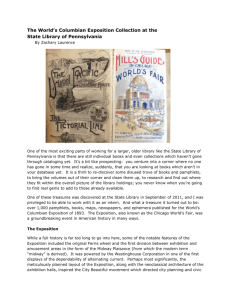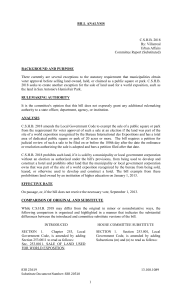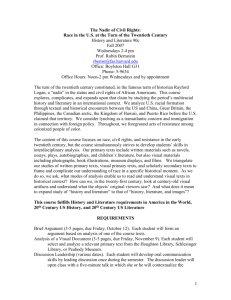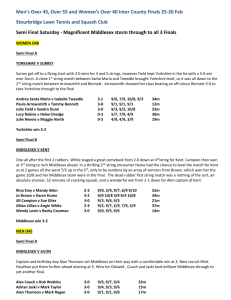General Comments in Response to the Middlesex/Writing Life Pieces
advertisement
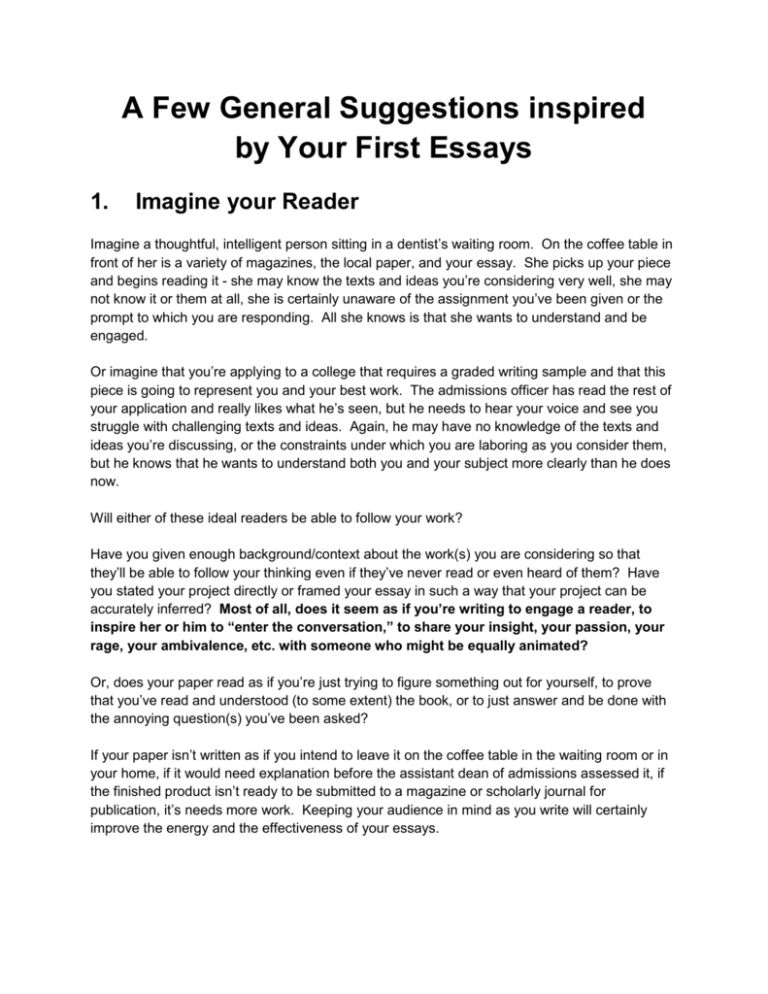
A Few General Suggestions inspired by Your First Essays 1. Imagine your Reader Imagine a thoughtful, intelligent person sitting in a dentist’s waiting room. On the coffee table in front of her is a variety of magazines, the local paper, and your essay. She picks up your piece and begins reading it - she may know the texts and ideas you’re considering very well, she may not know it or them at all, she is certainly unaware of the assignment you’ve been given or the prompt to which you are responding. All she knows is that she wants to understand and be engaged. Or imagine that you’re applying to a college that requires a graded writing sample and that this piece is going to represent you and your best work. The admissions officer has read the rest of your application and really likes what he’s seen, but he needs to hear your voice and see you struggle with challenging texts and ideas. Again, he may have no knowledge of the texts and ideas you’re discussing, or the constraints under which you are laboring as you consider them, but he knows that he wants to understand both you and your subject more clearly than he does now. Will either of these ideal readers be able to follow your work? Have you given enough background/context about the work(s) you are considering so that they’ll be able to follow your thinking even if they’ve never read or even heard of them? Have you stated your project directly or framed your essay in such a way that your project can be accurately inferred? Most of all, does it seem as if you’re writing to engage a reader, to inspire her or him to “enter the conversation,” to share your insight, your passion, your rage, your ambivalence, etc. with someone who might be equally animated? Or, does your paper read as if you’re just trying to figure something out for yourself, to prove that you’ve read and understood (to some extent) the book, or to just answer and be done with the annoying question(s) you’ve been asked? If your paper isn’t written as if you intend to leave it on the coffee table in the waiting room or in your home, if it would need explanation before the assistant dean of admissions assessed it, if the finished product isn’t ready to be submitted to a magazine or scholarly journal for publication, it’s needs more work. Keeping your audience in mind as you write will certainly improve the energy and the effectiveness of your essays. 2. Understanding the Difference between Exposition & Analysis Exposition is a mode of writing that strives to describe, detail and accurately and vividly depict its subject. It commonly relies on summary and paraphrase and often provides essential detail and context for analytical work. If the goal of exposition is to present WHAT IS, the goal of analysis is to explore and explain how “whatever what is is” WORKS - what it does, how its component parts fit together, how it serves as an essential component in larger elements within or outside the work, etc. Saying that Middlesex is interested in issues of identity is certainly accurate, but it’s also fairly selfevident to anyone who’s read the book (or, perhaps, even its back cover). Spending two pages showing where the book addresses identity seems a waste of time. For an essay on identity in Middlesex to succeed, it’s got to explore what Middlesex wants to say about identity, and how, and why its take on or approach to identity is especially interesting, surprising, effective, offensive, etc. A good general rule - if you are merely making the case for the existence of your subject, arguing for its presence within a work, you are still in the realm of exposition. Tell us how your subject works, what it does, what it means and why it matters within and beyond the context of your piece and you’ll be entering the realm of analysis. 3. When and Why Your Conclusions Should Become Your Claim If you don’t realize what you think, how you feel, what you intend to say ABOUT your subject until you reach the end of your paper, don’t feel as if your paper has failed. It hasn’t - it’s shown you what you want to say. Now all you have to do is move your conclusion up toward or into the introduction of the essay and devote your new draft to exploring your newly discovered focus in greater depth and detail! 4. Don’t Confuse the Wood to Be Split with the Chopping Block Talking about yourself as a means of getting at your subject is a great strategy, but reversing the process can lead you away from your project. To say that you were drawn to Cal’s situation because you too have struggled to understand how the past has shaped your life, and to point to specific moments where this struggle is rendered most artfully, is a savvy way to frame your discussion and engage your reader. On the other hand, to say that Cal’s struggles helped you to make sense of your own life may be accurate, but it will only be interesting to those of us who know and care about you. Don’t lose sight of your subject. 5. Dictionaries can be essential but are often unnecessary Be precise with your terms. Calling The Writing Life a novel is not just inaccurate, it suggests that you didn’t read or understand the text very well; criticisms of the book seem less valid when you assess it based on completely inappropriate expectations. Inaccurate or lazy definitions compromise your ethos and your argument. Having said that, you are hereby FORBIDDEN to define words that do not require explanation. No one needs help from Webster to understand what air or water on hunger is; unless you are going to challenge or complicate the standard definition of something, please don’t waste time and space defining it!!! 6. IT’S ALWAYS ABOUT LANGUAGE - THE AUTHOR’S AND YOURS Bottom line: read closely, quote effectively, say insightful things not only about what a text says but how and why it says it, and you’ll be in very good shape. How do we know we’re doing this right? Good question. The answer, or answers, sound simple. You’re meant to be reading and writing as a critic, as a fan, as someone with his or her eyes open. Through careful reading and tireless reflection, you have made yourself an expert on your subject, and we casual observers, we with energy and interest but perhaps less expertise, are eager to benefit from your insight. Tell us what you’ve seen, what you’ve been thinking about, help us to recognize and process essential elements of the text that we might not see, or see as significant, without your keen eye and compelling language; leave us knowing or wondering about something we had not considered before, eager to return to your subject and to continue the discussion you’ve introduced to us, and you have more than done your job. In other words, you know you’re on the right track if you are: asking a question where there seemed not to be one. pursuing something puzzling, addressing something you want to figure out rather than presenting something you already understand. making explicit and exploring the meaning of something implicit; bringing something in the shadows into the light; playing with the significance of possible centers. demonstrating connections between or among elements of a subject and explaining the significance of these connections. accounting for dissonance and explaining why certain things seem not to fit together. attempting to precisely identify your subject and its significance; to call a thing what it is. trying to explain something that needs to be explained.
